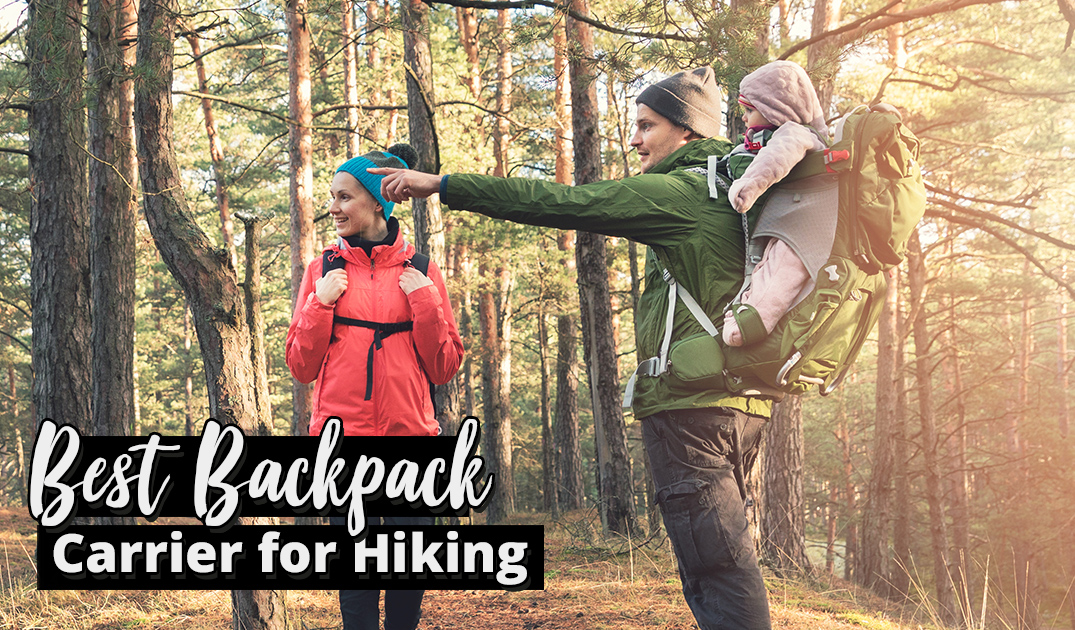Having a kid didn’t stop me from hitting the trails. I got this top-rated baby carrier for hiking, and I was able to carry my child for hours.
The following list contains the top-rated baby carriers for hiking. After reviewing different backpack carriers, the Osprey Packs Poco AG Child Carrier is by far the best baby carrier for hiking. It as all the necessary features, such as an aluminum frame with a stand and a sunshade to protect your little one. However, the other carriers bellow are also fabulous options if you are looking for a more affordable bay carrier for everyday use.
After reading the following guide, you will know exactly which baby carrier is the best for hiking.
- Hiking Backpack Carrier Buying Guide
- Selecting The Right Types Of Carriers
- What Is A Good Backpack Hiking Carrier?
- How To Choose The Best Hiking Carrier?
- Features To Look For When Shopping For A Hiking Carrier
- Things To Consider When Buying A Hiking Carrier
- Useful Tips For Hiking With The Kids
- Takeaway
Staying active with your family is excellent for keeping everyone healthy and spend quality time together. Therefore, going for a hike is a great option!
Getting fresh air and exercise, letting the kids burn off some energy, and being at one with nature has some great benefits. However, if you have younger children or a baby, you’ll need a suitable baby carrier that you can trust will do the job.
Many parents trust baby carriers and swear by them. Still, there are some features you should look for when purchasing a carrier to take on your family hiking adventures.
Here’s my list of the best baby carriers for hiking and tips for choosing the best one for you and your little one.
Best Baby Carrier For Hiking
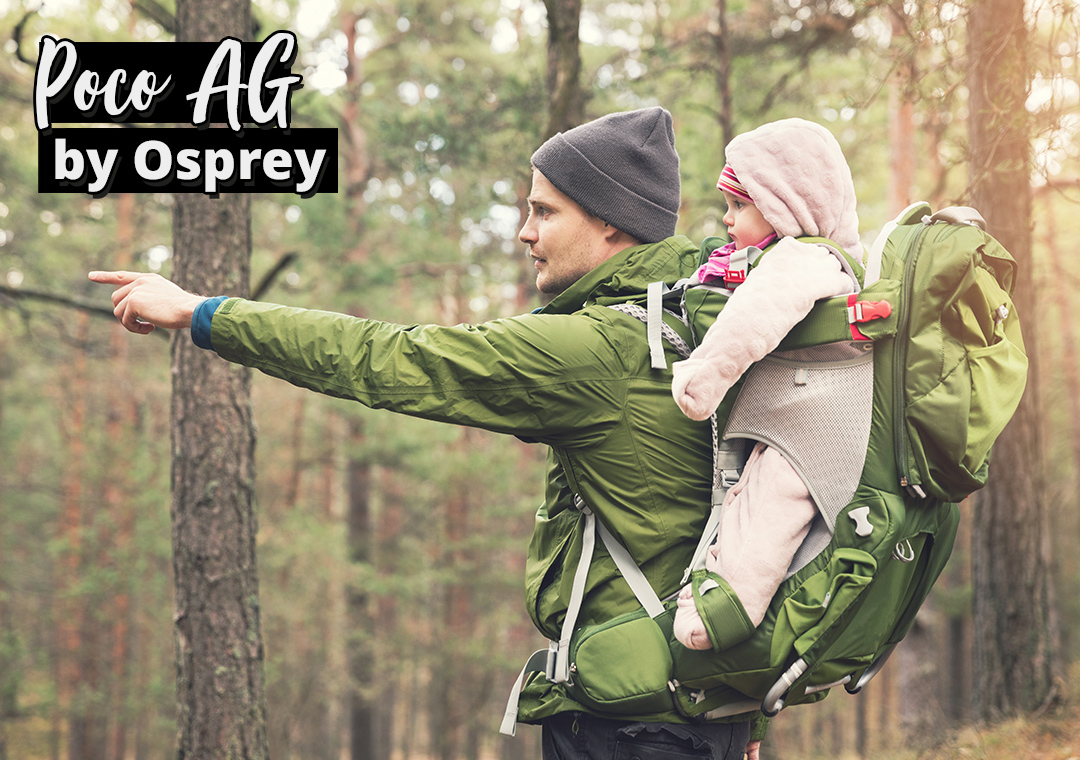
Osprey Packs Poco AG Child Carrier
This carrier is best for babies and kids who are 6 months and older and weigh up to 48.5lbs. It’s ideal for parents who are looking for a top-of-the-line carrier that offers stability and storage.
The Osprey Packs Poco AG Child Carrier is an award-winning carrier that is popular among parents. 83% of purchasers rated the pack 5 stars. The anti-gravity system of this Osprey is built for hikers, as it allows parents to carry their kid effortlessly while maintaining stability and balance. It offers a lot of storage to keep your supplies close while hitting the trail.
Highlights:
- Award-winning
- Anti-Gravity
- Stability
- Adjustable to fit all body types
- Extra storage options
- Sunshade
- Lightweight aluminum frame
- Built-in changing pad
- Flexible mesh back panel
- Double halo harness
- High quality
- Well-known and trusted brand
- Great for hiking
- Comfortable
- Easily Adjustable
Considerations:
Age: This carrier is recommended for 6 months or older because there are no inserts for babies who can not hold their heads up and.
Adjustable Waist Strap: This carrier doesn’t have a waist strap that is ultra-adjustable, but does offer an additional 5 inches of room.
Storage Options: It has fewer storage options than the plus model, like a water bottle holder or a zippered waist pocket.
Price: On the more expensive side because of quality and features.
Features:
Weight: The carrier weighs in at just about 8lbs.
Stability: The Osprey Packs Poco AG Child Carrier offers a lot of stability because of its Anti-Gravity suspension system.
Easy to use: There is a small learning curve, and the carrier is easy for parents to get on and off quickly.
Sitting Position: Your baby sits in a position that can be dangerous for smaller children, which is why Osprey has a minimum of 6 months old recommendation in place.
Storage: Excellent storage options if you’re looking to take an extended hike. A removable pack comes ready to store all your baby supplies.
For all details, price, and shipping option check out the Osprey Packs Poco AG Child Carrier on Amazon here.
Best Baby Carrier For Hiking Under $300
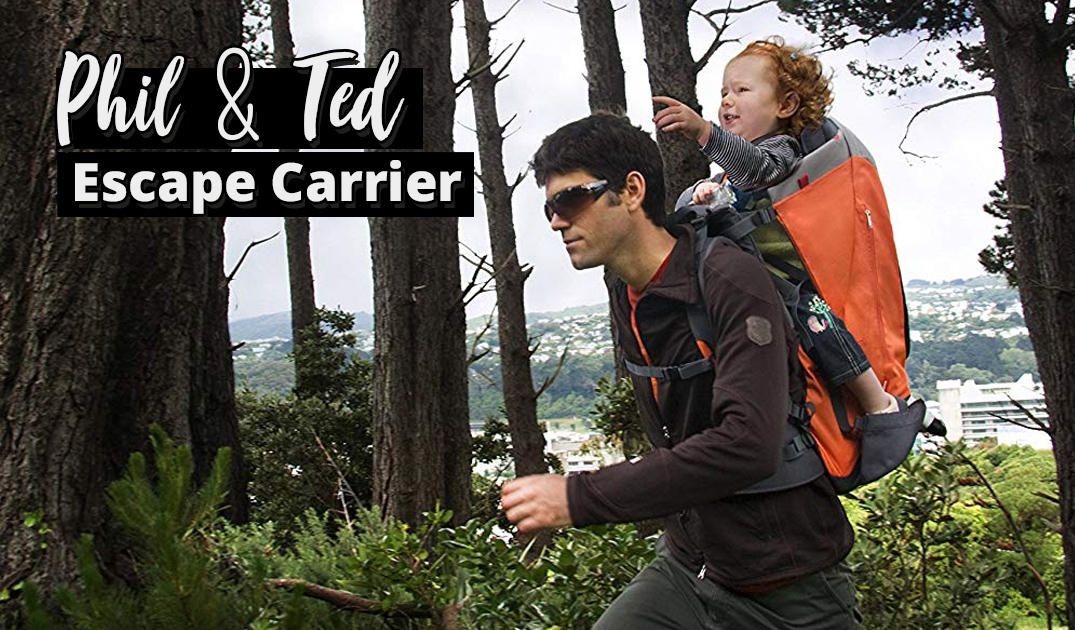
Phil & Ted Escape Baby Carrier
Parents who are looking to purchase a high-quality, yet affordable, hiking baby carrier.
The Phil & Ted Escape Baby Carrier is suitable for kids from 3 to 36 months old. Therefore, it’s a good investment if you aren’t looking to replace the carrier often, as it will grow with your baby. Moreover, it’s a safe and secure option for parents who want their baby to feel comfortable during long adventures.
Highlights:
- Removable day pack
- Built-in change pad
- Rear-view mirror
- Comfortable headrest
- Sunshade
- Rain shield
- Body-tech harness system
- Hydration Pouch
- Stirrups
- Beautiful design and color selection
Considerations:
Position of baby: The cockpit is situated relatively far from your back, which could cause some insecurity and discomfort for parents.
Not that easy to adjust: Many parents have complained that adjusting the straps of this particular carrier isn’t very easy and can take some fiddling.
Only holds up to 39lbs: This is a much lower top weight than many other carriers on the market.
Rain Cover: It’s pretty small and only covers the top of the carrier, so your little one’s legs would not be covered.
Features:
Weight: The Phil & Ted Escape Baby Carrier is one of the lightest, weighing in at 6lbs 10oz.
Comfort: Parents say it is exceptionally comfortable. This carrier also features stirrups for your little one to improve circulation in their legs while sitting.
Support: This carrier has been designed for lumbar support and comfort.
Storage: This carrier has over 30L of storage space. It can contain a hydration bladder (not included).
This carrier is beautifully designed with great color options. It has a lot of cool add-ons that are great for parents that want to spend a lot of time outdoors or like to take longer treks.
For all details, price, and shipping option check out the Phil & Ted Escape Baby Carrier on Amazon here.
Best Frameless Baby Carrier For Hiking
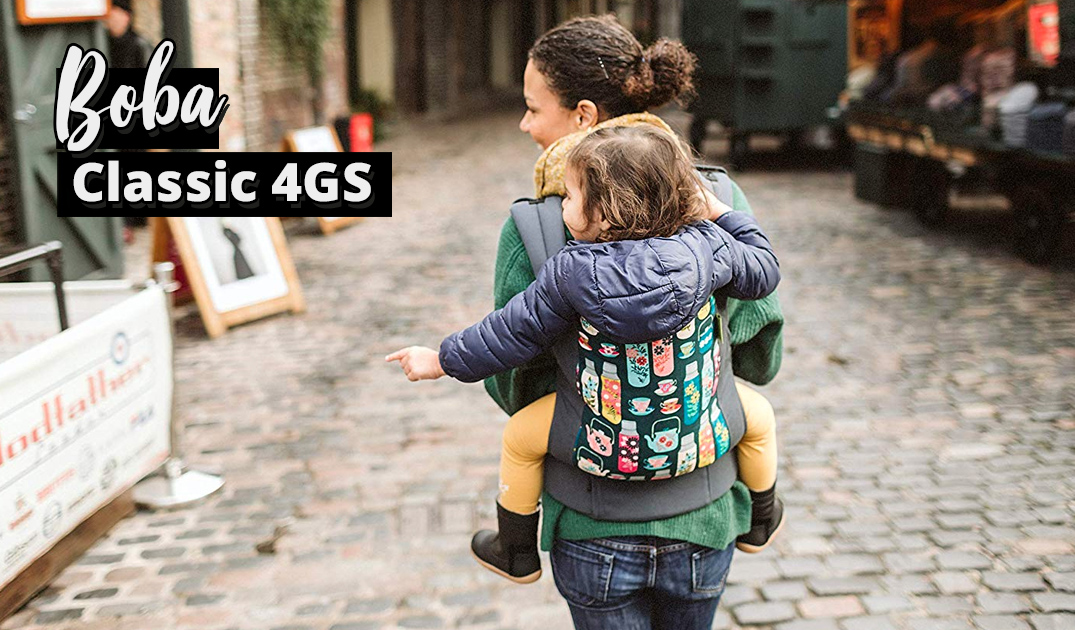
Boba Classic 4GS Carrier
Best for parents who want a soft carrier that is light and keeps your little one close. The Boba Classic 4GS Carrier is best for those who are looking to get outdoors but wish to partake in shorter, less intensive hikes.
Made for children between 7 to 45 lbs, this front-facing carrier is perfect for parents that want to take short hikes while keeping their baby comfortable.
This lightweight carrier has a lot of fans, and here’s why:
Highlights:
- Lightweight (Weight: 2.2lbs)
- Keeps baby close and secure
- Removable sleeping hood
- Adjustable straps
- Ergonomic support
- Easy to clean
- Comfortable
- Multiple pockets
- Quick-release buckle
- Breastfeeding
- Purse strap holder
- Infant insert for smaller babies
- 100% cotton
- Convertible from front-facing to backpack style
Considerations:
Not freestanding: Because this is a soft carrier and it doesn’t have an aluminum structure (like other hiking carriers above), it can be a little tricky getting baby in and out.
Attracts lint easily: It attracts debris very quickly but is machine washable, so the problem is quickly dealt with.
Not ideal for longer hikes: Because of the soft structure, this carrier is only recommended for short journeys outdoors.
Features:
Comfort: Many people rave about the comfort level with the Boba Classic 4GS Carrier. It keeps the baby in a good position that is comfortable for parents, and it is adjustable, so you’re able to find that perfect fit.
Ease-of-use: This carrier is very easy to use. It even has a breastfeeding buckle that allows for easy nursing on the go.
Sitting Position: This carrier is front-facing for babies up to 25lbs. Also, it can be converted into a backpack style for children up to 45lbs.
Storage capacity: There are multiple small pockets and a purse strap holder for moms to bring their purse along.
Materials: Since this carrier is made from 100% cotton, it is breathable and light. It keeps your little one close and secure and keeps you comfortable during your adventures.
For all details, price, and shipping option check out the Boba Classic 4GS Carrier on Amazon here.
Hiking Backpack Carrier Buying Guide
Need help choosing? I have gathered all the essential information you have to know to make a clear decision. I contain all the answers you could look for.
Selecting The Right Types Of Carriers
There are 4 main types of carriers:
1. Wraps
Essentially, a wrap is a long piece of fabric that you wrap around your baby and tie on one shoulder.
A wrap is an excellent choice for a baby, but not ideal for an older child on a hike or outdoor adventure. They can also put a lot of pressure on one side of your body, and that is not ideal during an outdoor excursion.
2. Slings
Slings are also referred to as ring slings. Similar to wraps, they offer a little more adjustment because they have a ring on one shoulder.
This type of carrier is not ideal for hiking because there is no extra storage and, like wraps, puts too much pressure on one part of the body. It’s more suitable for running errands or carrying your baby around the home.
3. Soft-Structured Carrier
A soft-structured carrier (SSC) is a soft, frameless carrier that allows for more comfort.
These can be an excellent option for toddlers who might want to walk part of the hike and be carried for shorter amounts of time.
Most models of these are suitable for both front and back facing positions, and they are light enough to be carried on their own with ease.
4. Backpack Carrier
The backpack carrier was designed for long hikes or needing to carry your little one for long periods like you would a backpack.
They are more ergonomically designed for your comfort, most of them have great storage options, and are usually very adjustable. Also, the metal frame offers more security to your children in case you fall.
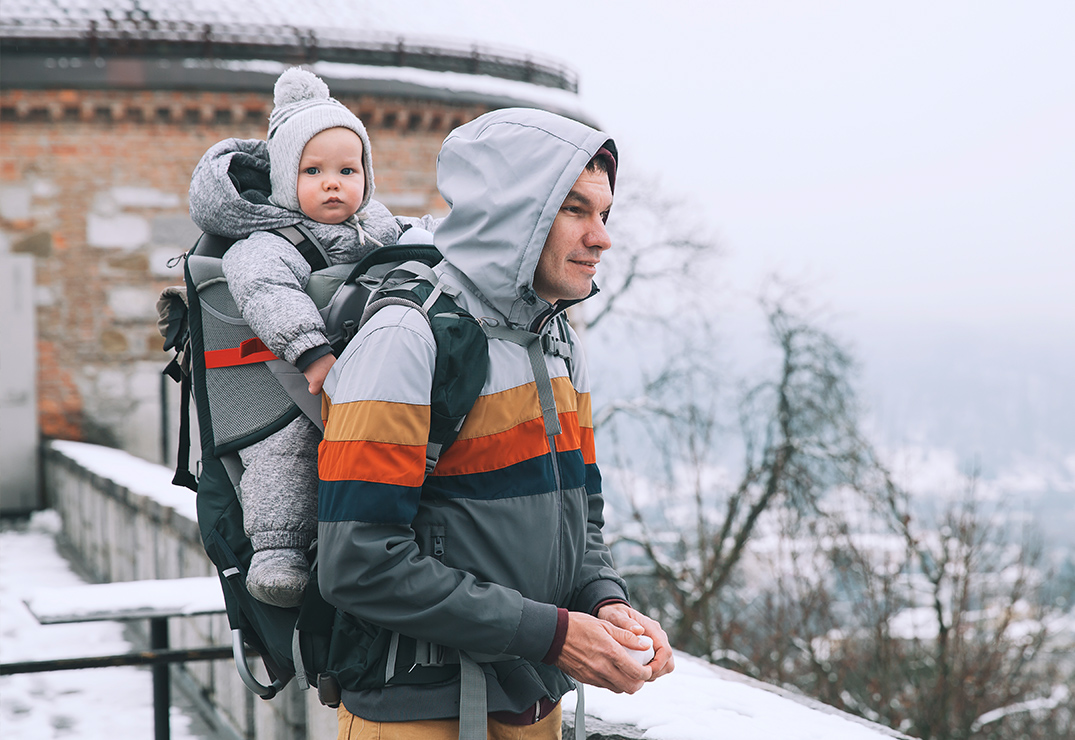
What Is A Good Backpack Hiking Carrier?
Things to consider when purchasing the ideal carrier for hiking are:
- Weight
- Comfort
- Ease-of-use
- Sitting Position
- Storage capacity
- Price
- Extra features
Make sure your carrier is extraordinarily comfortable, doesn’t put pressure or cause tension in your back, and is easily adjusted on the go.
Start by researching what features and benefits are most important to you before you shop around.
You want something durable that is ergonomic and worth the money you’re spending. Always take a look at the reviews for some of the top brands when purchasing.
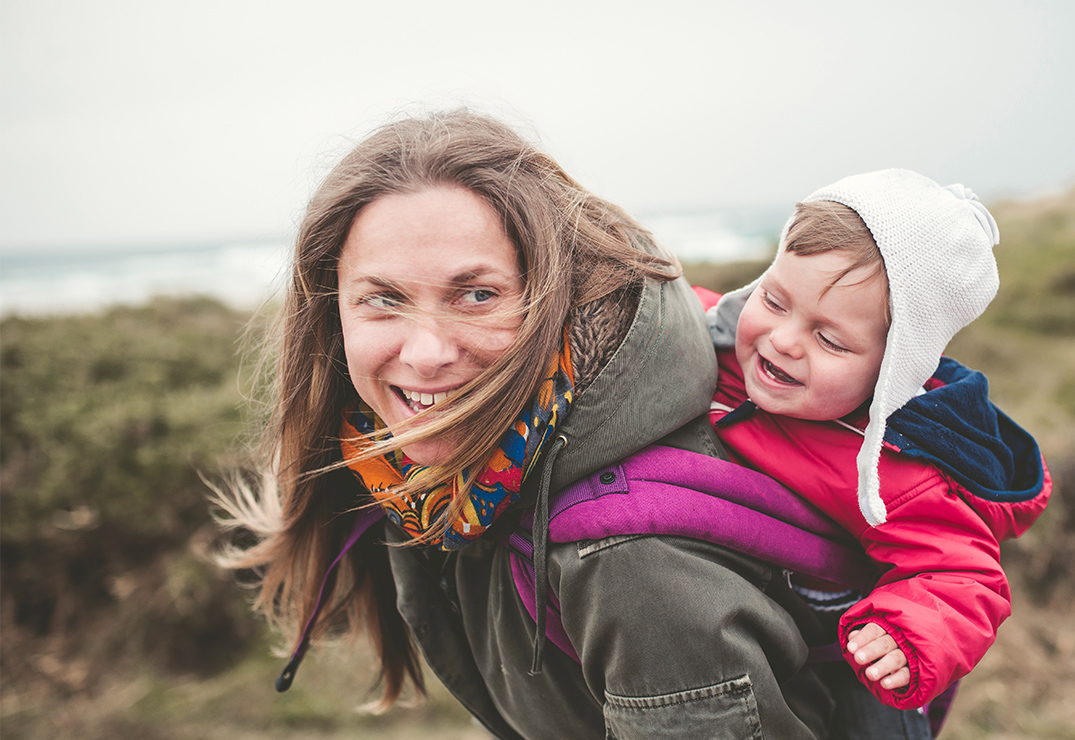
How To Choose The Best Hiking Carrier?
Here are the things you want to consider when choosing your baby carrier:
1. Your baby
How old and how big is your kid? This will narrow down your search immediately. If you’re going hiking with your little one under three months, you likely won’t be going on a 12-hour hike, and a wrap or sling might be best for you. Toddler?
Depending on how adventurous they are, you may want to choose a soft carrier or a backpack carrier.
2. Your goals
How long are you planning on hiking? All-day trip or just a few hours? Do you have a specific trail in mind?
If you are looking to take shorter trips, you can get away with a less ‘heavy-duty’ carrier than one that is specifically designed for long hikes. Therefore, you will probably save you some money.
On the other hand, if you are an avid, serious hiker, you might want to splurge on higher quality and sturdier carrier.
3. Who is using the carrier?
Are you the sole user of this new carrier, or do you want your spouse or parents to be able to adjust and pop it on quickly?
If you’re going to use the carrier interchangeably with your spouse or hiking partner, it would be worth it to get an adjustable carrier.
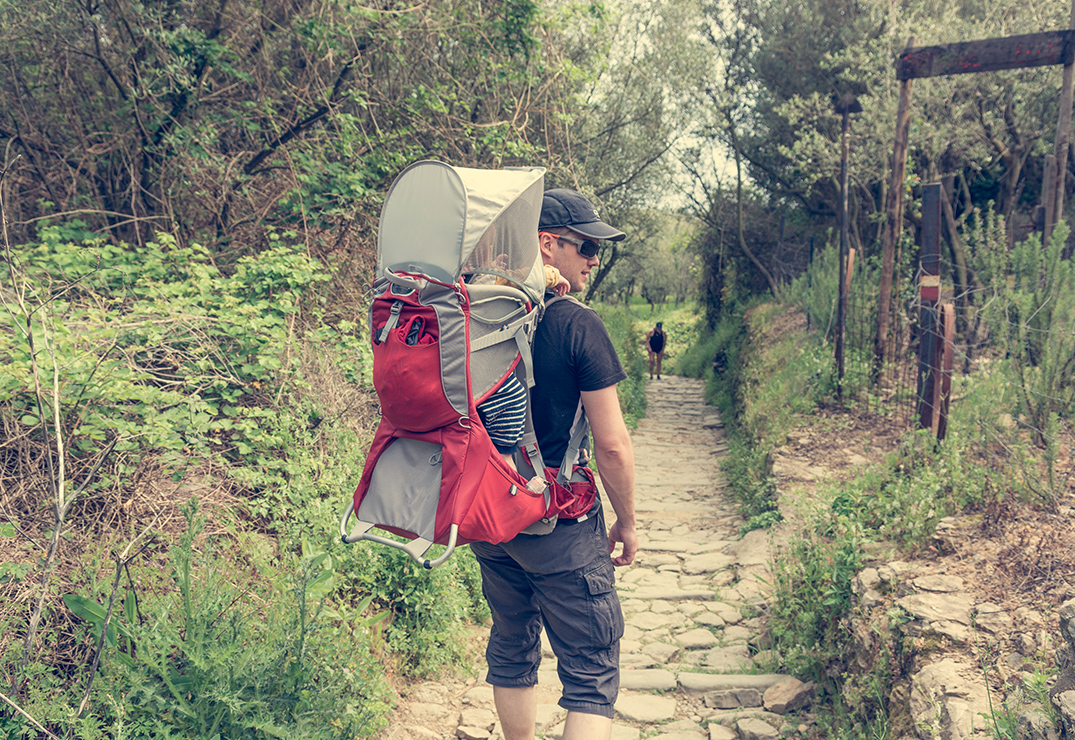
Features To Look For When Shopping For A Hiking Carrier
Here are the 10 essential features to look at when choosing a carrier for hikes:
1. Type of carrier
There are pros and cons to both soft and hiking carriers. It depends on what kind of hikes, for how long, and the age and weight of your child.
Hiking carriers tend to be more durable, and they are built to grow with your child. They also offer extra support, as they’re freestanding, so when you go to take your little one in and out, it’s easier.
2. Comfort
Given that you’re the one carrying your child around, you want the carrier to be comfortable for you and your back, and your baby, so they don’t fuss the whole time.
Features that add to the level of comfort should be considered, depending on your personal preference. Typically, that’ll look like a structured backpack design that has loads of features that are built to be ergonomic and easy to use.
3. Weight
A soft carrier is an incredibly lightweight option that can usually be folded up and stored easily.
Checking the weight of a structured carrier before your little one is in it is an important decision. You don’t want a 15lb carrier with a 30lb child plus all the items you need to store and bring along with you!
Keeping the starting weight in mind when purchasing can be an essential selling point for parents.
3. Padding
Going back to your comfort level, extra padding goes a long way, and so does the placement. Extra shoulder padding, hip padding, or back support are life-saving features.
4. Does it feel secure
The last thing you want is to be in the middle of a hike with your baby position too far back, too close to you, or not feeling super secure.
Baby should be snug, yet comfortable, and you should feel confident that they will be safe riding in the carrier you choose.
You want to make sure the harness is also sturdy and secure.
5. Protection against sun and rain
Depending on the climate where you live, how hot it is on the days you’re hiking, etc., too much sun exposure won’t make your little one feel so good.
A carrier that has built-in protection will be a nice feature to have. Rain protection is also excellent for unexpected weather changes that can sometimes happen.
It’s great to be prepared for anything, and it’s nice to have those features readily available with your carrier.
6. Adjustability
As I discussed earlier, if you want the carrier to be used between multiple wearers, this will be a crucial aspect of the carrier you purchase.
If you’re the sole-wearer, it might not be an essential feature for you. Typically if it’s being shared between parents, there will be a pretty significant adjustment needed, so it’s something to keep in mind.
7. Versatility
Since most of these carriers can be pricey, you are making an investment in your little one, so you want it to last a while. Carriers that are versatile and can grow with your baby are ideal.
Many soft carriers can be used as front-facing for infants up to a certain age and weight. Then they convert into a backpack carrier for another recommended age and weight.
8. Storage
If storage is an essential factor in your purchasing decision, you have plenty of options. Many hiking carriers offer pockets, detachable storage that comes along, water bottle storage, and other storage options.
Depending on how much you are willing and able to carry, there is quite a variety of carriers with different levels of storage options.
9. Ventilation
Having excellent ventilation is particularly vital while being active. Not only will you be hot from exercising, but having your little one so close to you will increase your body temperature.
It’s critical to keep you both comfortable, so a carrier with excellent ventilation is ideal for hiking. Your ventilation needs may vary depending on the climate where you live.
10. Stirrups
Stirrups are a premium feature, but they can be hugely beneficial to your baby. They help promote circulation in the legs, can help keep your little one more comfortable, and will take the pressure off of their joints while resting in the carrier.
If you’re looking to take longer, more intense hikes, this might be a feature you need.
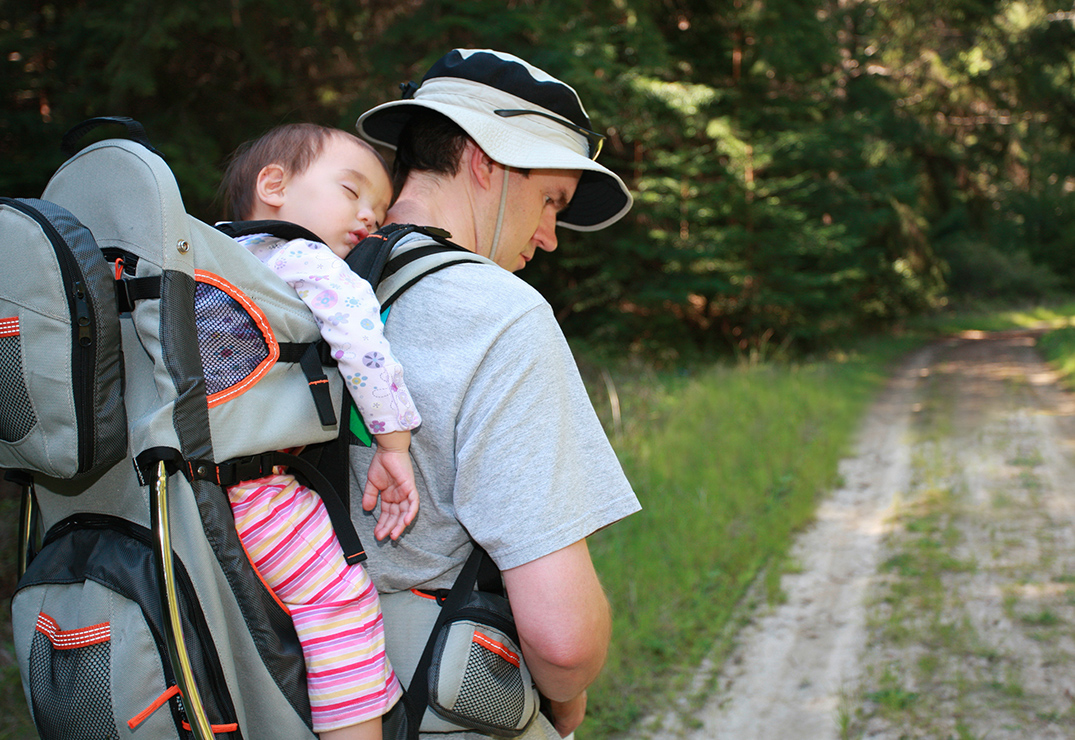
Things To Consider When Buying A Hiking Carrier
Manufacturer Recommendations
Companies that produce these carriers don’t just slap on recommendations willy nilly. They should be addressed with care.
Therefore, always follow the age and weight recommendations – it’s for your safety and the safety of your little one. Most companies will provide an age range and a low and high weight that they recommend for their products that they have determined through testing.
If your little one is not able to hold his neck confidently yet and you put him in a carrier not intended for kids under 6-month-old, your baby can seriously hurt himself.
JPMA Certification
Carriers for sale in the USA must adhere to the Frame Child Carrier Standard from the Consumer Product Safety Commission. These standards are in place to protect against hazards like exposed springs or hardware, sharp edges, or folding in where carriers shouldn’t.
If your desired carrier has this certification, it means it has been tested by a 3rd party, and it is safe.
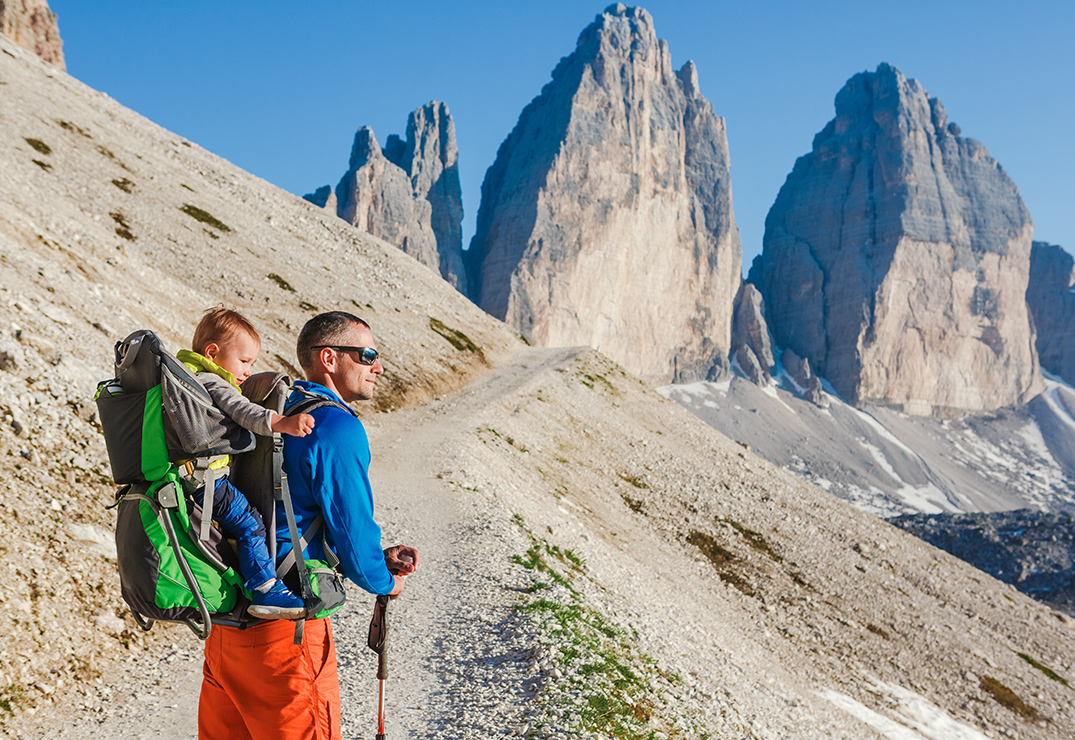
Useful Tips For Hiking With The Kids
Remember your purpose
Always remember your goal when you set out on your adventure: to have fun and spend quality time together!
Getting your kiddos excited about the outdoors from a young age can build healthy habits, and you want to create fond memories. So be patient and remember why you wanted to do this in the first place.
Safety
Always make sure you’re following the instructions set out by the manufacturer of your carrier for age and weight recommendations. While you’re out hiking, safety is always first, and you want to take every precaution to prevent any issues.
If they don’t like it, try again!
Kids are fickle, and if your little one isn’t impressed by your hiking adventure, you can always try again later. What they don’t enjoy right now, they may change their mind by the next time you take them out.
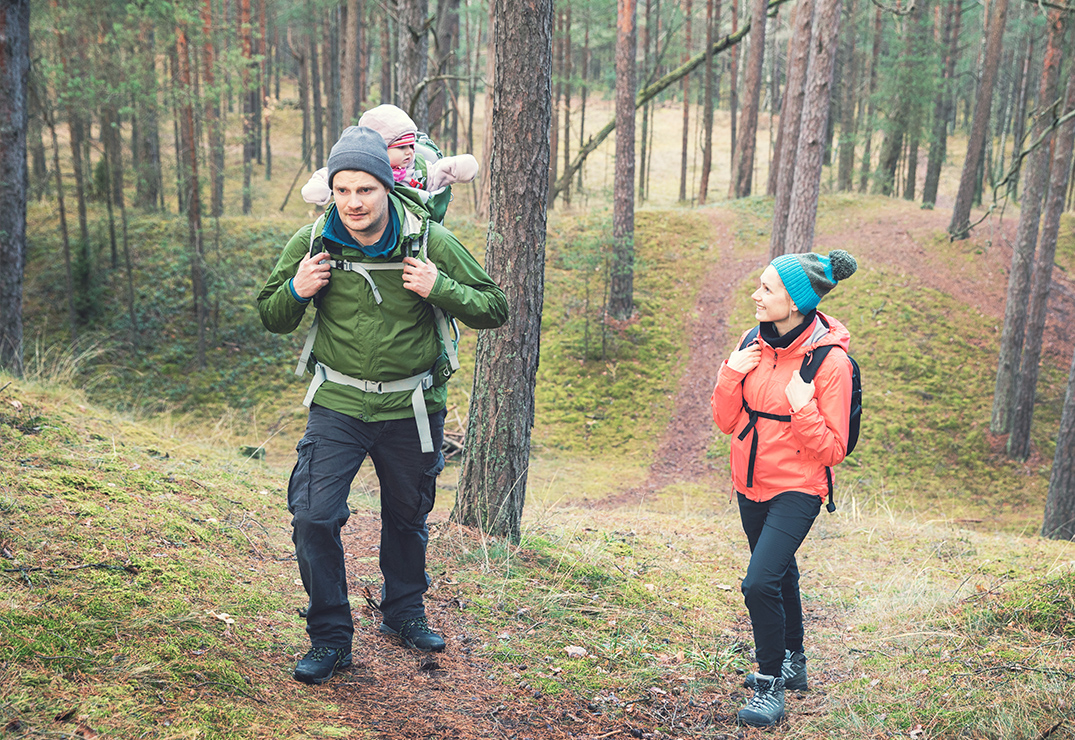
Takeaway
Here’s my comprehensive list of the best baby carriers for all your outdoor adventures. These are highly-reviewed, high-rated carriers. Still, you always want to make sure you invest in one that meets all your must-have characteristics.
For me, it was the Osprey Packs Poco AG Child Carrier who check all the boxes of a perfect hiking baby carrier.
Happy hiking!
P.S. Want to know which baby carrier is most suitable for you, your baby, and your budget? Check out this list of the top baby carriers. Within 5 minutes, you’ll know exactly which one to pick!
Base on my experience as a dad of 2 kids, plus genuine insights from my friends, and the hundreds of online reviews from other parents, I was able to identify the best baby carriers you could buy.
Still unsure about the baby carrier? Here are some other types of carriers you should also consider for your baby:

